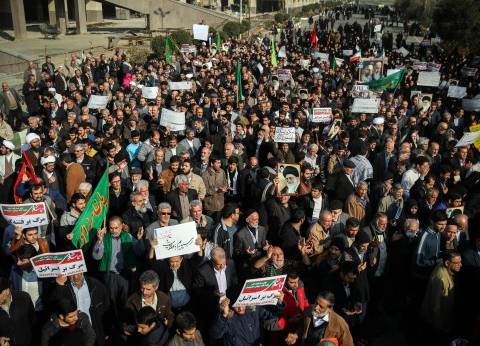|
It is too early to determine where Iran’s protests are going: To change the regime or reform it. Are they the beginning of a revolution against the regime or a mere adjustment in its policies? Either way, the people of Iran and the region as a whole could benefit from a change in Iran’s policy of meddling in its neighbors’ affairs while neglecting the needs of its own citizens..
The mass protests started on Thursday and have quickly become the largest since the “Green Revolution” of 2009. Last week’s events started with large demonstrations in Mashhad, Iran’s second largest city and a conservative stronghold. Within three days, they had spread to towns all over Iran, such as Ahvaz, Amol, Arak, Ardabil, Bandar Abbas, Dorud, Esfahan, Gorgan, Hamedan, Kashan, Kashmar, Kerman, Kermanshah, Khorramabad, Neyshabur, Qazvin, Qom, Rasht, Sari, Shahinshahr, Shahrekord, Shahroud, Shiraz, Urmia, Yazd, Zanjan, Zahedan and finally to Tehran; in other words, all over Iran’s political, ethnic and regional landscape.
.
Observers have made comparisons between these recent protests and the “Green Revolution” protests against the 2009 Iranian presidential election results. Those protests, which started in June 2009 and continued into 2010, were spurred by the disputed re-election of former President Mahmoud Ahmadinejad against reform candidates Mir-Hossein Mousavi, Mehdi Karroubi and others. The official election results claimed that Ahmadinejad had won 63 percent of the vote, despite widespread irregularities and projections that the opposition candidates would win larger shares.
.
The 2009-10 protests were suppressed through the use of excessive force and widespread atrocities committed by the Islamic Revolutionary Guard Corps (IRGC) and the paramilitary Basij. The Green movement was symbolized by Neda Agha-Soltan, a young woman who was shot dead in broad daylight and whose last moments were captured by cameras and broadcast the world over.
.
While similar in size, the recent wave of protests appear to be markedly different from those in 2009-10, which were organized by supporters of opposition candidates who did not question the overall legitimacy of the Iranian regime at the time, but questioned election results. By contrast, the recent demonstrations appear to be directed against the entire establishment, including the Supreme Leader and his military and security arms, such as the IRGC and Basij. The quick spread of the protests to almost every corner of the country is another marked difference.
.
Initially, they appeared focused on economic complaints, such as unemployment and inflation, with chants against Rouhani and his administration. Very quickly, they started to attack the Supreme Leader, Ayatollah Khamenei, and the IRGC, two previously untouchable institutions. Also unprecedented was the explicit and widespread criticism targeting Iran’s involvement in Syria and Lebanon, citing Lebanese Hezbollah by name — a hitherto hallowed regional proxy for Iran.
.
In fact, however, the economic and political aspects of the protests are closely linked. The economic suffering of ordinary citizens is a direct result of the regime’s external policies and costly adventures throughout the region and beyond.
Demonstrations throughout the country appear to be directed against the entire establishment, including the Supreme Leader and his military and security arms — marking them out as different from the Green Revolution of 2009.Iranian citizens certainly read the news and visit neighboring countries. They need to go no further than their brothers across the Gulf to notice that Iranians have gotten a short shrift, especially in economic terms, since 1979, the year of the Iranian Revolution. For example, the United Arab Emirates, the GCC country with which Iranians are most familiar, has managed to produce an economic miracle over the last four decades, while Iran has retreated on almost every economic and social front.
Abdel Aziz Aluwaisheg
.
With only about one-ninth of Iran’s population, the UAE’s economy has surpassed that of its near neighbor. In 1979, Iran’s GDP at $90 billion was almost three times that of the UAE, which at the time was around $31 billion. Today, UAE GDP has jumped to $407 billion, ahead of Iran’s GDP of $368 billion in goods and services. UAE per capita GDP of $46,000 dollars is more than 10 times that of Iran’s $4,500. Social indicators have also suffered in Iran over the past decades: Its rank in life expectancy, for example, has declined from 129th to 153rd in the world.
.
Iran is one of the richest countries in the region in terms of resources, but it has failed to direct those riches toward the welfare of its people. Iran is believed to hold the fourth-largest oil reserves and the second-largest gas reserves in the world. And, with its large population and educated labor force, it could have harnessed those resources as their neighbors have done with fewer resources.
.
Instead, the Iranian regime has directed its resources and its people’s energies into constructing a complicated web of militias and terror groups to wreak havoc in the region. It funds Hezbollah of Lebanon and dozens of sectarian-based groups from Pakistan to Syria to Yemen. It finances, arms and trains terrorists from Bahrain, Kuwait and Saudi Arabia, among others. Instead of providing economic assistance or humanitarian aid to vulnerable communities, Iran provides them with weapons.
.
Iran’s adventurism has not been limited to the Gulf region. Its agents have spread violence in many parts of Asia, Africa and Europe, as well as North and South America.
.
Iran is also developing its ballistic missile program at a rate rivalled only by North Korea, which poses a serious threat to regional peace and security. It has also drained more resources that should have been spent on improving the living conditions of its citizens.
.
The cost of Iran’s adventures is not lost on ordinary Iranians. With these protests, they are demanding accountability and reform. And if reform does not come soon, their demands for a regime change could get louder.
.

Comments
Post a Comment